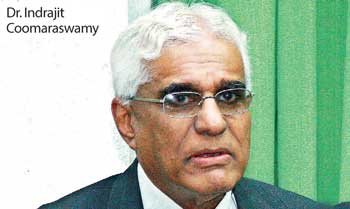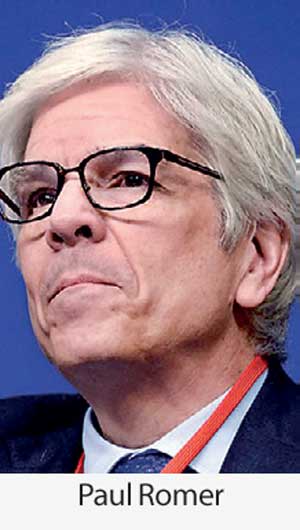26 Jan 2018 - {{hitsCtrl.values.hits}}
 By Chandeepa Wettasinghe
By Chandeepa Wettasinghe
The World Bank controversy on the Ease of Doing Business Index rankings has spilled over into Sri Lanka with the World Bank contradicting a statement by Central Bank Governor Dr. Indrajit Coomaraswamy that Sri Lanka would be receiving a higher ranking.
“It is nice to know that we might be 89 instead of 111. That was the news today because of issues the World Bank had,” Dr. Coomaraswamy said at a seminar organized by the Ceylon Chamber of Commerce this week.
When Mirror Business inquired on the matter, he said that with the news of Chile being penalized in the rankings, a revision was on the cards, and that he would be contacting the local World Bank office to see when the revised rankings would be published.
World Bank Chief Economist Paul Romer earlier this month said that countries—in particular Chile—are discriminated in the rankings for political reasons. The rankings website (www.doingbusiness.org) was down yesterday.
World leaders have expressed outrage following the statement as the rankings heavily influence investor sentiments and global financial flows.
When Mirror Business inquired from the World Bank on the 2018 ranking revision for Sri Lanka, it said that the next update would be for 2019 to be published in October this year.
“Doing Business (DB) rankings are reassessed annually and announced around October each year. There has not been any revision to the DB 2018 ranking. Improvements are recorded once final users confirm the positive change. Updated rank will be available in October 2018,” a World Bank spokesperson said.
The World Bank further said that it is very supportive of the Government of Sri Lanka’s efforts to simplify the regulatory environment to enable business development, and has been providing technical assistance to help this effort.
The rankings are benchmarked to data available in June. Sri Lanka has set up eight task forces to reach the top 70 ranks by the 2020 edition.
In a statement on allegations made by Romer, the World Bank said that its methodlogy is impartial and based on ongoing internal and external reviews, with changes made following extensive stakeholder consultations.
However, it said that it is taking the allegations seriously.
“In light of the concerns expressed by World Bank Chief Economist Paul Romer in the media and our commitment to integrity and transparency, we will conduct an external review of Chile’s indicators in the Doing Business report,” the World Bank said.
Romer, who is a celebrated economist, was sidelined within the global development lender after internal clashes, and this week resigned after apologizing for his remarks.
WB chief economist quits after Chile comments
 REUTERS: Paul Romer stepped down as the World Bank’s chief economist on Wednesday after he came under fire for saying that Chile’s rankings in a closely watched “Doing Business” report may have been deliberately skewed under socialist President Michelle Bachelet.
REUTERS: Paul Romer stepped down as the World Bank’s chief economist on Wednesday after he came under fire for saying that Chile’s rankings in a closely watched “Doing Business” report may have been deliberately skewed under socialist President Michelle Bachelet.
Romer’s resignation, just 15 months after taking the job, was announced in an internal note that was posted by World Bank President Jim Yong Kim and seen by Reuters.
“Paul Romer has informed me that he is stepping down from his position as chief economist, effective immediately,” Kim said in the announcement.
“I appreciated Paul’s frankness and honesty, and I know he regrets the circumstances of his departure,” Kim said, adding that Romer would return to his position as economics professor at New York University.
Kim said the World Bank would launch a global search for a new chief economist.
Caption Paul Romer
In an interview with The Wall Street Journal on Jan. 12, Romer apologized to Chile for changes to the report’s methodology that he said “conveyed the wrong impression” about the business environment under Bachelet.
The annual report has long been controversial because it ranks countries based on indicators that grade them on how their government bureaucracies affect, and often limit, their business environments.
Chile currently ranks at 55 out of 190 countries on the list, down from 34 in 2014, the year Bachelet took office. In other recent years its rankings were to 41 in 2015, 48 in 2016 and 57 in 2017, the World Bank’s reports show.
Romer told the newspaper that the decline resulted from methodological changes, rather than a deterioration of Chile’s business environment, and may have been the result of the World Bank staff’s political motivations. He told the newspaper he would revise the reports.
20 Nov 2024 9 minute ago
20 Nov 2024 11 minute ago
20 Nov 2024 41 minute ago
20 Nov 2024 50 minute ago
20 Nov 2024 2 hours ago